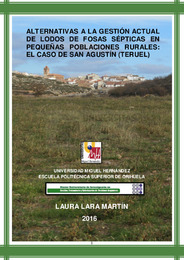Please use this identifier to cite or link to this item:
https://hdl.handle.net/11000/3033Alternativas a la gestión actual de lodos de fosas sépticas en pequeñas poblaciones rurales: el caso de San Agustín (Teruel)
| Title: Alternativas a la gestión actual de lodos de fosas sépticas en pequeñas poblaciones rurales: el caso de San Agustín (Teruel) |
| Authors: Lara Martín, Laura |
| Tutor: Paredes, Concepcion Barrena Gómez, Raquel |
| Issue Date: 2016-07 |
| URI: http://hdl.handle.net/11000/3033 |
| Abstract: Teruel es una provincia caracterizada por una gran cantidad de municipios de muy escasa población, más de un tercio de los municipios no llega a los 100 habitantes censados (34,4%) y el 81,36% tiene menos de 500 habitantes. Muchos de estos municipios tienen importantes fluctuaciones estacionales de población, que dificultan su gestión de residuos, especialmente el caso de los lodos que quedan tras el proceso de depuración de aguas de origen urbano. En los territorios rurales estas aguas se suelen almacenar en fosas sépticas o balsas de decantación, las cuales generalmente son vaciadas por un gestor autorizado. Este trabajo pretende evaluar las posibles alternativas a la gestión actual, tales como el empleo de los lodos residuales para la producción de biogás o como enmienda orgánica. Con este objetivo se evaluó el potencial de biodegradabilidad aerobia y anaerobia de diferentes muestras de lodos fecales del municipio turolense de San Agustín. Para llevar a cabo este estudio se determinaron en los lodos parámetros como pH, conductividad eléctrica, sólidos totales y volátiles y DQO. También, se realizó una respirometría dinámica del lodo y un test de biodegradabilidad anaerobia, sometiendo posteriormente el digestato final a una estabilización aerobia. Por último, se hizo un test de germinación para conocer el grado de madurez del residuo final obtenido tras todo el proceso. Los resultados obtenidos mostraron el lodo séptico estudiado tenía suficiente potencial para degradarse tanto aeróbica como anaeróbicamente, proponiéndose como posibles alternativas la estabilización aeróbica (por ejemplo, mediante compostaje) y/o digestión anaerobia. Sin embargo, los digestatos obtenidos deberán de sufrir un tratamiento posterior antes de su uso agrícola. Estos digestatos mostraron una menor degradabilidad que los lodos sin tratar y su fitotoxicidad se redujo al someterlos a una estabilización aerobia posterior. A pesar de ello no se alcanzaron los valores establecidos para su empleo como enmiendas orgánicas Teruel is a province characterized by a large number of municipalities with very low population, more than one third of the municipalities does not reach the 100 registered inhabitants (34.4%) and 81.36% have less than 500 inhabitants. Many of these municipalities have significant seasonal fluctuations in population, which hinder their waste management, especially the case of sludge remaining after the water purification process of urban origin. In rural areas these waters are usually stored in septic tanks or settling basins, which are usually emptied by an authorized agent. The objective of this study was to evaluate possible alternatives to the current management, such as the use of sewage sludge for biogas production or organic amendment. For this goal, the potential for aerobic and anaerobic biodegradability of different samples of faecal sludge from a municipality from Teruel (San Agustin) was evaluated. To carry out this research, parameters as pH, electrical conductivity, total and volatile solids and COD were determined in septic sludge. Also, this waste was treated by a dynamic respirometry and an anaerobic biodegradability test, and the final digestate was stabilized in aerobic conditions. Finally, a germination test was employed to assess the degree of maturity of the final material obtained after the process. The results showed that septic sludge had enough potential to degrade both aerobically and anaerobically, proposing as possible alternatives aerobic stabilization (for example, composting) and / or anaerobic digestion. However, the digestate obtained should undergo further treatment before agricultural use. This digestate showed lower degradability than untreated sludge and phytotoxicity was reduced by aerobic stabilization. However, this aerobic stabilised digestate did not reached the values of germination test established for its use as organic amendment |
| Keywords/Subjects: Lodos |
| Knowledge area: CDU: Ciencias aplicadas: Ingeniería. Tecnología: Ingeniería sanitaria. Agua. Saneamiento. Ingeniería de la iluminación |
| Type of document: info:eu-repo/semantics/masterThesis |
| Access rights: info:eu-repo/semantics/openAccess |
| Appears in Collections: TFM - M.U Gestión, Tratamiento y Valorización de Residuos Orgánicos. |
.png)

